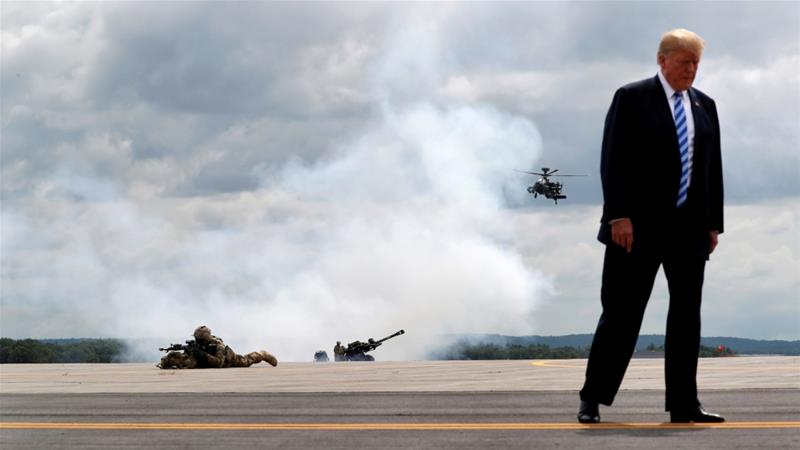Iran accuses US of 'deliberately targeting civilians'
Severe sanctions reimposed after US nuclear deal pullout aimed at making life unbearable for ordinary Iranians, FM says.
US sanctions on Iran are “deliberately targeting innocent civilians” and amount to economic terrorism, its foreign minister said.
Mohammad Javad Zarif made the comments on Wednesday at the United Nations in New York City. Earlier he said Iran needed ballistic missiles to protect itself from US-backed foreign invaders – an arsenal the United States argues must be curtailed.
Tensions between Iran and the US sharply escalated after President Donald Trump unilaterally withdrew from a landmark 2015 nuclear deal between Tehran and world powers and reimposed punishing sanctions, sending its economy into freefall.
Trump called the nuclear deal one-sided, but for years it successfully prevented Iran from developing an atomic bomb.
The US is “deliberately targeting innocent civilians to achieve illegitimate political objectives” with the severe sanctions, Zarif told a UN forum.
The sanctions have exacerbated an economic crisis that has sent Iran’s currency plummeting, and has also blocked vital goods such as medicine from entering the country. Iranians face severe shortages and inflated prices for what is still on store shelves.
As economic hardship deepens, about 30 percent of patients now buy medicine over the counter without a prescription because people cannot afford to pay physician fees, Iraj Harirchi, the deputy minister of health, said earlier this month.
No missile talks
Iran has no choice but to manufacture missiles for defence purposes, Zarif said on Wednesday.
He said in an interview with NBC News earlier this week if the US wants to talk about Iran’s missiles it needs “first to stop selling all these weapons, including missiles, to our region”.
Iran has long rejected negotiations over its ballistic missile programme, which remains under the control of the Iranian paramilitary Revolutionary Guard that answers only to Supreme Leader Ayatollah Ali Khamenei.
The foreign minister’s remarks suggested a possible opening for talks as tensions remain high. But the Iranian mission to the UN promptly called Zarif’s suggestion purely “hypothetical”.
Iranian missiles were “absolutely and under no condition negotiable with anyone or any country, period”, it said.
In Tehran, the Ministry of Foreign Affairs spokesman Abbas Mousavi tweeted late on Tuesday that Zarif’s comments meant to challenge Washington, and “threw the ball into the US court while challenging America’s arms sales” to its Middle Eastern allies.
Zarif also backpedalled on the missiles issue, saying Iran has no choice but to manufacture the missiles for its own defence.
He cited the 1980s Iran-Iraq war, in which the US backed Iraqi dictator Saddam Hussein with weapons and logistics.
Saudi Arabia, the United Arab Emirates, and other regional rivals of Iran regularly receive multibillion-dollar arms shipments from the US.
‘Not prepared to pay’
Iran recently began surpassing uranium enrichment limits set in the nuclear deal, ratcheting up pressure on its European partners to find ways around the US sanctions, especially for crucial Iranian oil sales.
“I think the Europeans want to preserve the JCPOA but unfortunately they’re not prepared to pay anything. They’re not prepared to invest in their security,” Zarif told Al Jazeera, using the acronym for the nuclear accord’s formal name.
“At the end of the day, they’re allowing the United States to set the agenda. I don’t know whether that’s in the interests of the Europeans.”
Zarif also said tight US travel restrictions on Iranian diplomats and their families living in New York are “basically inhuman”. They’re restricted to travel from the UN, the Iranian UN mission, the Iranian UN ambassador’s residence and John F Kennedy airport.
“It is certainly not a friendly action … But for me it’s fine because I don’t have any work anywhere other than the three buildings,” Zarif told reporters
While Iran restarts aspects of its nuclear programme, the US has vowed Tehran will never be allowed to develop a nuclear weapon.
The standoff intensified to the point where Trump was minutes away from ordering his military to launch an attack on Iran after the Revolutionary Guard shot down a US drone last month.
The US has rushed thousands of additional troops, an aircraft carrier, nuclear-capable B-52 bombers, and advanced fighter jets to the Middle East amid unspecified threats from Iran.
Inside Story
What’s the US plan for Iran?
Source: Read Full Article




